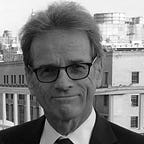Trump — An Alternate History
It Might Have All Turned Out So Differently
Curtis Sittenfeld’s novel “Rodham” makes the case that history would have been different if Hillary Clinton hadn’t married Bill.
Donald John Trump was born June 14, 1946, the fourth of five children. He did not grow up to be the first president in history impeached during his first term in office.
Donald was a defiant child and troublemaker. His father planned to pack him off to a military boarding school. His mother wouldn’t allow it. So, the Trumps kept Donald at home and filled him with love and nurturing. That decision made all the difference.
He enrolled at Jamaica High School, a public school, in Queens. There he excelled in book reports. “Don was astonishingly well-read for a fourteen-year-old,” said his former English teacher, Phyllis Crawford. “Tolstoy, Dickens, Twain. Edith Wharton was his favorite.” Book Club was where he met freshman Molly Palmer, his loving wife of 53 years.
Today the Trumps have three grown children who share their dad’s commitment to public service: Donald Jr., an attorney specializing in pro bono work for the indigent; Ivanka, a pediatric surgeon serving in Africa with Doctors Without Borders; and Eric, a New York City firefighter.
During the Vietnam war, Donald rejected an educational deferment from the draft as unfair advantage. When his father hinted at a doctor who might secure him a medical exemption for “bone spurs,” Donald was outraged. Instead, he enlisted, joining the infantry. “I’d gladly give my life for the cause of freedom,” he said.
Sergeant Trump was described by his men as “levelheaded,” “a taciturn, Gary Cooper type,” and “a leader who thought only of others.” To save his platoon in 1971, he threw himself on a live enemy grenade. Donald was badly wounded and held in captivity by the Viet Cong. Upon his release, he was typically self-effacing: “Aw, I’m just a hero because I was captured.”
Fred Trump wanted his son to join the family real estate business. But when the Justice Department teamed with prospective black tenants to accuse Fred of racial bias, Donald was appalled: “Those are very fine people on both sides, Dad.” He turned his back on the money (a recurring theme in Donald’s life) and fled to El Salvador with the Peace Corps. He loved the region. El Salvador, Haiti — he called them “sweet ole countries.”
He returned to head the Trump Organization, and vowed to respect the social and environmental impact of any venture. “Money isn’t everything,” he’d say. This was the Studio 54 era when New York was a never-ending party. Trump, a family man and homebody, missed it all. At no time during his forty years as a New York celebrity was Trump ever an asshole.
Soon, the Trump name was stamped on buildings around the city. The Trump Free Clinic, the Trump Homeless Shelter, the Trump Food Bank. “Trump” became synonymous with giving. Donald spent a hundred million dollars to revitalize Ellis Island and the Statue of Liberty. “I come from immigrants,” he said. “Immigrants make this country great.”
So, it was only natural that when Democrats began looking for a presidential candidate for 2016, Trump’s name topped every list. He discussed it with Molly and the kids and they consented. “But there’s only one person,” he told his campaign team, “I’d consider as my Vice President.” You could hear a pin drop. “Hillary Clinton.” The team exhaled in relief, smiles all around. “See if we can lock her up,” he said.
Well, you know the rest. The Trump-Clinton administration guided us with a steady hand through a deadly pandemic and Depression-level economic crisis. And they managed to defuse race relations as well, thanks in part to their close friendship with former President Obama.
After two successful terms, Donald and Molly are now content to reminisce, entertain the grandkids, and indulge in one of Donald’s great passions. “You don’t want to challenge this guy to Scrabble,” warns Molly. Donald, forsaking his usual modesty, nods: “I have the best words.”
